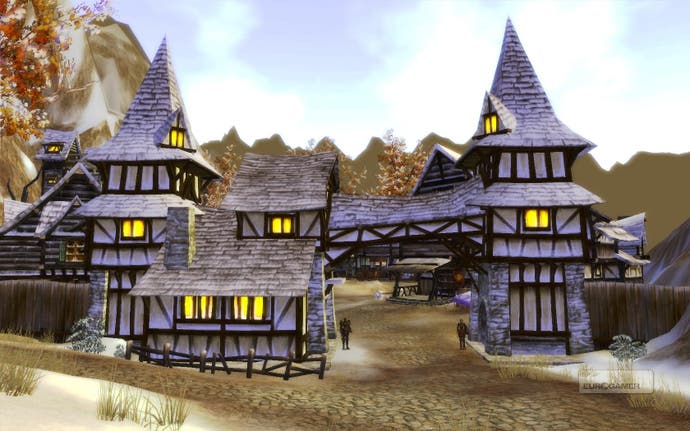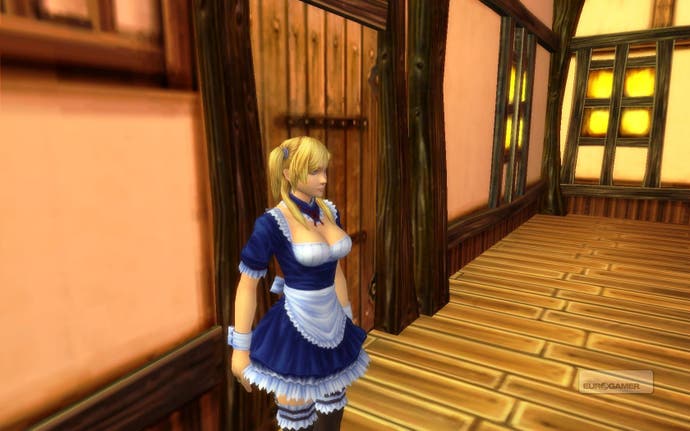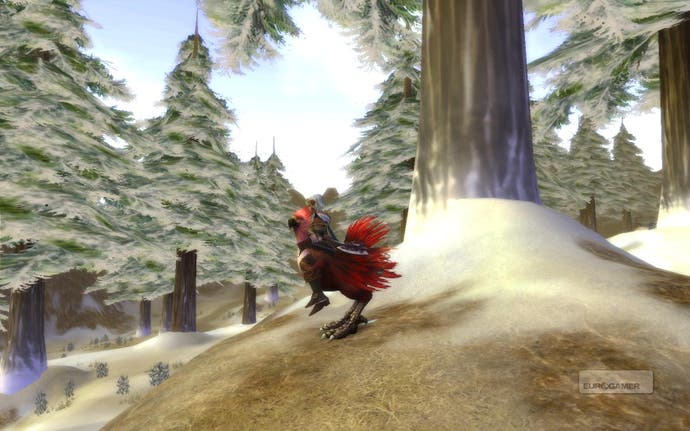Runes of Magic
They've taken WOW, and they've runed it.
Conversely, if you just want a more casual experience, the only things you may feel the need to spend real world money on are more storage space and mounts (much of the other items for sale with Diamonds are either cosmetic, like furniture for your house, or to do with augmentation, transport, or bonuses, like pots to double your XP gain). Is this fair? It's a thorny question, but arguably playing less, paying less and playing hardcore, paying more has a certain logic compared to the flat rate of a subscription-based game.
Many play MMORPGs for the more straightforward experience of having a laugh with guild-mates, getting mesmerized by grinding, and exploring a new world. The accessible parts of Taborea, as it stands, probably cover an area a little smaller than WOW's Kalimdor. It's not a bad size for the game's current 50 levels of adventuring, offering a varied selection quests, regions and instances. Beyond the Pioneers Colony, there are the Howling Mountains, then Silverspring, where the majestic city of Varanas is located. It features administrators, trainers, vendors and even a novel solo instance, Malatina's Dungeon, based around a grid of squares with randomised spawns.
Alternatively, you can port over to Reifort in Sascilia Steppes. This is a nicely designed region, where you work your way around quests, levelling up in an anticlockwise direction around a central gorge, The Scar of Despair. Progress takes you through forest, snowy wastes and desert (Dustdevil Canyon, where the Obsidian Stronghold is located, with its PVP arena and facilities).

Runes of Magic also has a dual class system. At 10, you visit Varanas where you can choose your secondary class. After choosing your primary, this is the toughest decision you'll have to face in the game, as each class combination has advantages and disadvantages.
As mentioned in the preview, when you're in your primary class, you can only use the general abilities of your secondary class, and vice-versa. You change class by visiting your sex-doll "house fairy", or an administrator. Every time you swap between primary and secondary, you level separately, in effect. So for example, when I chose a secondary rogue for my primary warrior at 10, the rogue was only at level 1, and while she's level 1, so is my warrior. When I then level my rogue up to 12 say and swap back to my warrior, it is still at 10. This is a situation that will leave some scratching their heads, even Guild Wars veterans who had a similar situation with secondary class abilities, but not literal dual-class characters.

The upshot of the dual class system is a fascinating selection of hybrids, but there are issues, ranging from the basic matter of a warrior-rogue having to have maintain outfits in both chain and leather, or a knight-mage in plate and cloth, to the more involved considerations of how you invest your talent points for the most efficient dual-class builds. Again, spreadsheet gamers will love the possibilities.
There's also the matter of the energies and weapons different classes use. Warriors rely on rage; scouts use focus; rogues use energy; and mages, priests and knights use mana. One of the most popular combinations is the mage/priest, as both are cloth-wearing mana-users. Oh, and if you go priest/mage, you'd better like playing the healer - in a perennial MMORPG issue, there's a shortage of dedicated healers. This may change with the possible introduction of a new druid class.

Runes of Magic can seem a little rough round the edges. Some things still aren't fully implemented; the job of localising the game from its Taiwanese origins is inconsistent in places, and even things like the soundtrack can be a bit shaky (while it has nice touches, like the atmospheric background noises of crowd babble and children playing when you visit villages, it also has bad habits, like the orchestral score lurching in and out seemingly at random).
But Runes of Magic is by and large a robust, enjoyable game. As a free-to-play title, it's impressive. Although Western gamers will still have their reservations about amorphous RMT versus those nice straightforward subs, Runes of Magic is something of a landmark: it won't dislodge the subscription-based model in the West by any stretch of the imagination, but it does demonstrate that free-to-play doesn't necessarily mean rudimentary, shallow, cheap or totally brutal in the integration of RMT. Runes of Magic is a reasonable-quality MMO that, despite its derivative aspects, offers proper graphics, proper classes and an involved, involving world.







